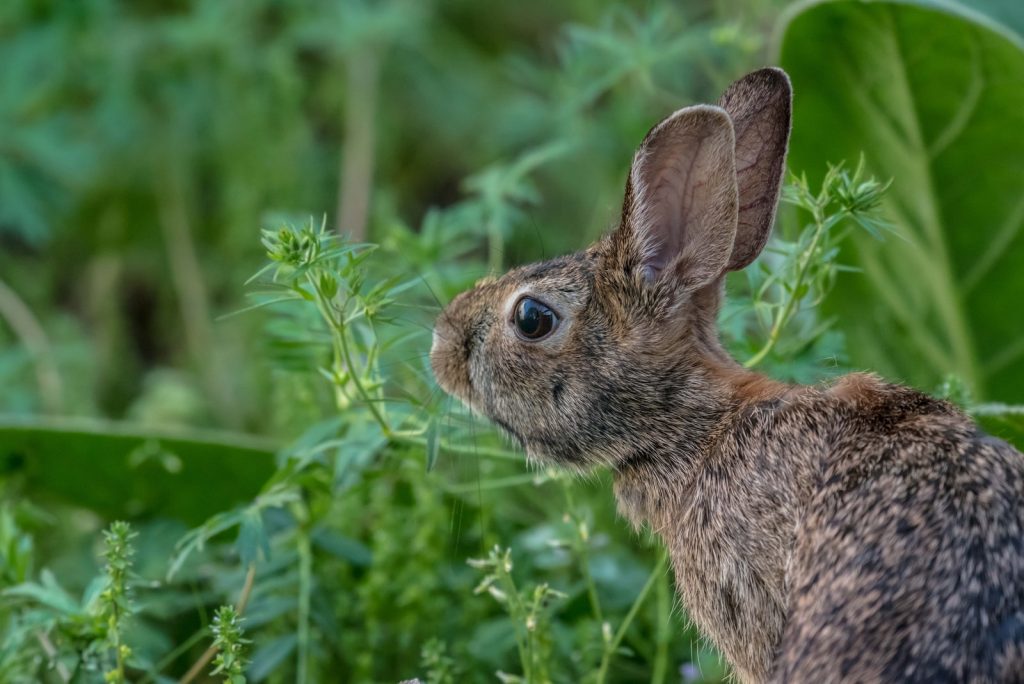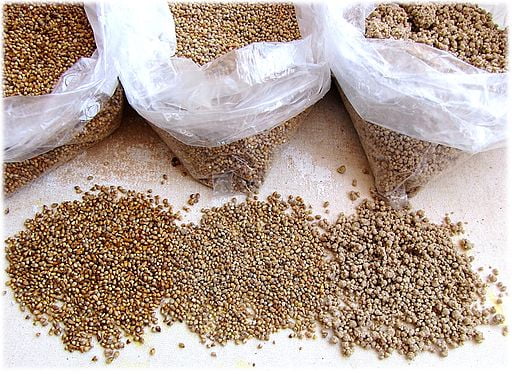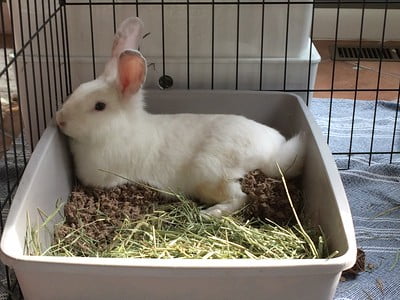Last Updated on March 13, 2023 by Marjon Ramos
Quick Facts About Pea Pods:
- Scientific name – Pisum sativum
- Also known as – Peasecod, seedcase, or husk.
- Origin – Mediterranean region
- Most commonly found in – Canada
- Average weight – 0.1 and 0.36 gram
Pea pods are safe to be given to rabbits as long as they are not eating them in lieu of hay. You should also wait until your rabbit is at least 7 months old before you give them one because it is high in sugar.
Also, if this is the first time you’re giving pea pods to your rabbit, take it slow and only give them in small quantities. This would ensure that your rabbit’s gut flora has time to get used to the new food and prevent any digestive problems.
Finally, pea pods are high in sugar, so you should limit them and prioritize other vegetables that are more beneficial to your rabbit’s health.
You can mix in a bit of pea pods to your rabbit’s vegetable mix if you really want to give them some.
Now that I’ve given you the gist of the article, read on as I explain in more detail why rabbits can eat pea pods:
Table of Contents
Do rabbits like to eat pea pods?
Because of the sugar content of pea pods, your rabbit will likely gobble up any pea pods you give them.
Here’s a video of a bunch of rabbits eating a bowl of pea pods:
Several people from rabbit communities have also reported that their rabbits love eating pea pods.
Here’s a quote from a rabbit owner that fed pea pods to their rabbits:
My bunny loves peas and the pea shoots. I cut off a section with some peas attached and she loves it
Bluebell’s Mum
We give ours pea pods and it makes them bonkers. Must be too much sugar, they don’t have any other sugary treats. So, unless you want to spend the evening yelling at them for ripping up the carpets then not too much!
lemonhead
Mine love the pods,i do remove the peas though first
Becca
My boys love pea pods, its one of their faves
lucyj
I’ve also personally fed pea pods to my two rabbits (Tyr and Freya), they always go crazy when I given them some!
Are pea pods safe to be eaten by rabbits?
Pea pods are safe to be eaten by rabbits as long as you only give them in moderation. Remember, vegetables like pea pods should only account for 10% of your rabbit’s diet.
The majority of your rabbit’s diet should be hay (fiber). Without the constant fiber in your rabbit’s gut, they are susceptible to digestive problems like GI stasis and diarrhea.
Also, young rabbits (> 12 weeks old) should not eat vegetables. In the case of pea pods, you should probably wait until your rabbit is at least 7 months old before giving them one because they are high in sugar.
What are the benefits of feeding pea pods to rabbits?
In order to know the benefits of pea pods for your rabbit’s health, you should first understand the required vitamins and minerals that a rabbit needs per day.
You can use the nutrient constrain calculator for rabbits. This calculator would tell you what nutrients your rabbit is getting whenever you feed them pea pods.
You can also click on the blue icon beside the nutrient to see its benefits and deficiency:
Nutrient Constrain Calculator For Rabbits
Warning
Although pea pods has these benefits, overfeeding your rabbit is not recommended. This is only to inform you of the different vitamins and minerals your rabbit can get when you give them pea pods.
As you can see from the nutrient constrain calculator for rabbits above, 100 grams of pea pods contain moderate amounts of vitamin A.
Are pea pods good for rabbits?
Pea pods contain moderate amounts of vitamin A. It also contains trace amounts of vitamin E, B6, copper, niacin, pantothenic acid, protein, choline, fiber, calcium, lysine, methionine and cystine, phosphorus, zinc, magnesium, and potassium.
All of which would benefit your rabbit’s health if fed in reasonable amounts.
How much pea pods can a rabbit eat?
The amount of pea pods you should feed your rabbits depends on your rabbit’s current weight and age.
You can use the diet portion calculator below to see how much pea pods (vegetables) you should feed your rabbits per day:
Diet Portion Calculator For Rabbits
If you don’t have a weighing scale, here’s the estimated weight of rabbits based on their breed and how much pea pods to give per day:
| Rabbit’s weight based on breed | Allowed pea pods per day |
|---|---|
| Small breed (1.1–3.5 pounds) | <128 grams |
| Medium breed (6 to 10 pounds) | 384-640 grams |
| Large breed ( 9 and 12 pounds) | 384-760 grams |
When can rabbits start eating pea pods?
The table above assumes that your rabbit is old enough (1–5 years old) to regularly eat vegetables (pea pods). Another important factor when deciding how much pea pods to give your rabbits is their age.
Here’s a table that shows how much pea pods you can give your rabbits as they get older:
| Age | Vegetables |
|---|---|
| 12 weeks | Introduce vegetables (one at a time) in small quantities < 1/2 oz (15 g) |
| 7 months to 1 year | Increase vegetables fed daily gradually |
| Adult (1-5 y) | 1-2 cups per 6 lbs (2.7 kg) BW |
| Seniors (>6 y) |
Make sure you follow the table above and only feed your rabbits vegetables (pea pods) if they are old enough. It’s also important to introduce any new food slowly and only in small quantities.
When should you not feed pea pods to rabbits?

Gist:
You should not feed pea pods to rabbits that have any digestive problems or when you notice any changes in their stool.
If your rabbit is already having digestive issues like uneaten caecotrophs or watery stool, then you should immediately remove any other food you’re giving to your rabbits except hay.
Your rabbit might not be getting enough fiber because you got the portion of their diet wrong. Remember that your rabbit should be eating 80–90% hay, 10% vegetables, 5% pellets, and occasional treats.
Finally, bring your rabbit to a veterinarian just to be safe. Most of the time, rabbit owners misdiagnose their rabbits with just softer stool, which can be corrected by feeding more hay. When in fact it’s diarrhea, which is fatal to rabbits.
Risk of overfeeding pea pods to rabbits.
- Uneaten caecotrophs: Uneaten caecotrophs are usually caused by a diet that is low in fiber or overfeeding foods that are high in water content. pea pods alone could not meet the daily fiber requirement of rabbits. Therefore, pea pods should only be fed in small amounts as a supplement to a hay-based diet.
- Diarrhea: Overfeeding pea pods to rabbits could also lead to diarrhea because of the lack of fiber in them. Your rabbit’s diet should mainly consist of hay and pellets. Vegetables like pea pods should only be fed in small amounts because rabbits cannot get enough fiber from them. If your rabbit is suffering from diarrhea, bring your rabbit to a veterinarian immediately because diarrhea is fatal to rabbits extremely fast.
- Gastrointestinal stasis: Gastrointestinal stasis is also caused by a diet that is low in fiber and too many carbohydrates. When your rabbit is overfed with the wrong kind of food, like pea pods, it could lead to an imbalance in your rabbit’s gut flora and slow down the passage of food through the GI tract. If you suspect that your rabbit might be suffering from GI stasis, immediately bring your rabbit to a veterinarian because GI stasis could lead to organ failure and death if not treated.
- Dental problems: Due to the sugar content of pea pods, feeding your rabbits large amounts of them could lead to dental problems.
- Obesity: Overfeeding pea pods to older rabbits, whose metabolism is slower, could lead to obesity due to the high sugar content of p[ea pods. Obesity could also lead to uneaten cecotropes, or “poopy bottom,” because obese rabbits wouldn’t be able to reach their cecotropes to eat them.
Healthy alternatives to pea pods.
Your rabbit would love you if you provided them with different kinds of food.
Rabbits in the wild have an abundance of food available to them. This is why rabbit experts suggest giving your rabbits a variety of choices when it comes to food, because they believe that it’s the key to a healthy diet.
Here’s a list of vegetables and leafy greens that are a great alternative to pea pods:
- Spinach
- Celery
- Green peppers
- Basil
- Mint
- Alfalfa, radish & Clover sprouts
- Beet greens (tops)
- Parsley
- Peapods (the flat edible kind)
- Peppermint leaves
- Bok choy
- Escarole
- Clover
- Peppermint leaves
- Carrot & carrot tops
- Radicchio
- Raspberry leaves
- Wheatgrass
- Watercress
- Cilantro
- Dandelion greens and flowers (no pesticides)
Conclusion
Pea pods contain a lot of sugar, so you should go easy on them, especially if your rabbit is young or less than 12 weeks old.
The best way to feed pea pods to your rabbit is to mix them with other vegetables like fresh dark green leafy greens.
Finally, if this is the first time you’re feeding pea pods to your rabbit, you should take it slow and only give them small pieces at first to let their gut flora adjust to the new food.
Cite this article
Sources




